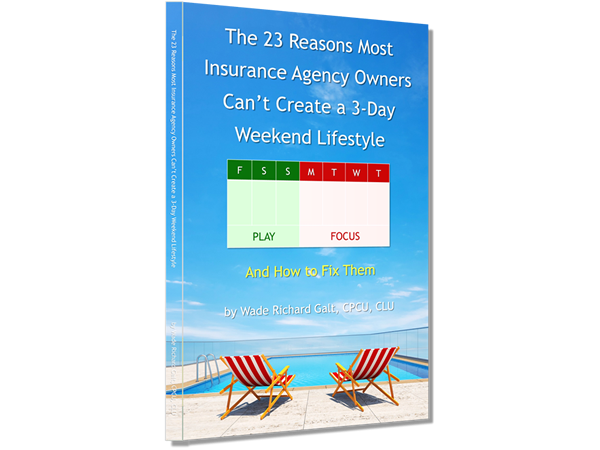5. Role Clarity - Step 2 to Create an Automatic Insurance Agency
Clarify Roles of the Experts Who will Implement your Automatic Insurance Agency Vision.
Quick Summary
-
When building an automatic insurance agency, it is crucial for each team member involved to define clear roles that focus on the three main areas: retention, growth, and multiline reviews.
-
One important role is to have someone dedicated to retaining business and managing P&C renewals to ensure high client retention rates, minimal lapses or defections, and running the agency on autopilot which allows the owner to focus on other aspects of the business.
-
Another role is P&C growth or acquisition expert wherein the primary goal is to find new sales opportunities that would not occur naturally and avoid high turnover business.
-
The third role involves conducting comprehensive multiline reviews with clients, evaluating auto, fire, life, health, and disability coverage to retain clients by offering tailored insurance solutions and cross-selling additional products.
-
Defining and understanding roles within the agency allows efficient operations and smooth functioning of the agency.
Full (Edited) Transcript
Role Clarity - Step 2 to Create an Automatic Insurance Agency
Once we've created our vision for our automatic insurance agency, the next thing we need to do is create distinct role definitions. We need to understand who's going to be executing this plan, not just our role, but the people around us. When you look at a multiline insurance agency, there are three distinct roles, and these are roles that focus on the three main areas. In a business, we want to make sure we're doing, we want to make sure we're retaining business. First of all, once you've been starting an agency, usually after about two or three years, at most, a significant amount, if not, the majority of your income is going to be coming from auto and fire or home or condo.
Whatever word you want to use, P&C renewals. And we want to make sure that we have somebody who is focused on that and a retention expert or renewal sales specialist. If you prefer that way of referring to it is somebody who can do the P&C order taking the orders that come in the door and they can do retention. And this person is extremely important simply because we want to make sure that the main part of this business model the renewal sales, the residual income. However, you want to word that is working accurately.
And this person's priority is to service and maintain the book to make sure the clients are happy that there are minimal lapses or customer defections and the retention is as high as possible and that they're running the agency pretty much on auto pilot that the agency owner does not need to be involved in the day to day operations. Now, depending on the size of your renewal book, you might need more than one person to do this. If you had a large business and 80 % of your business, you sold apples.
You'd want 80% of your labor going towards apples. In your case, if 80% of your income is coming from renewal sales, well then we want 80% of the labor making sure that those renewal sales are happening.
Maybe you can get it down to 70% with some efficiencies. But for the most part, we want to make sure we're not just focusing on new sales. And so in this role, success equals at least a year client. So if you look at lapse rate at which if you sort of interpolate that to reverse that, that would be a a retention rate that keeps inclined for eight years. This person's focus as the retention expert, is to help us make sure we can pay the salaries and the bills and makes it so.
The agency owner only needs to be involved in the retention part of the business or the renewal sales, maybe one total day per week or about 8 hours per week. It's the most profitable part of the business, and it's the part that provides the job stability for everyone. Since this is usually the biggest income generator in your agency. Whatever you do here is going to amplify. If this is handled really well, you're going to be free to enjoy running the operations of the rest of your business and taking time off.
If this is done poorly, everything else is going to be extremely difficult to execute. The second role is the P&C growth expert or acquisition person. Their job is to solicit P&C sales and leads. Want to be very clear here. This person is not really selling life and health insurance.
Maybe they do a little bit here and there, but their primary goal is to grow the P&C book, which eventually ends up being part of our retention book. We want them to grow it by finding sales that would not happen otherwise. To make a really clear distinction in some businesses, they'll talk about new sales or raw new sales, and they'll make a big deal of that. I'm more concerned about whether the business walked in the door or if the person made the business come in if the business walked in the door.
My retention expert in Red can handle that.
The business that would only walk in the door if somebody goes and finds that business or solicit it or networks or connect or as a center of influence, that's this person here in Green. So their job is to truly solicit quality sales, educate the client well, and avoid that costly business to high turnover business that's not going to be here in six months or twelve months. We don't want that in the first place. We want to make sure that their compensation encourages that success equals about at least a lapse rate or better on this new business.
That's at least a retention rate or better, because sometimes when this business is more aggressively solicited, it's not going to stay as long as opposed to somebody that already knew who you were, knew your company's, brand or your agency's.
Brandon walked in the door. This person is going to pivot from the fire to the auto or from the auto to the fire. So basically home to auto, auto to home or renters or condo. That's their first part of the process. This is a person who is more often considered what some people would call a Hunter, a high volume person, a Rainmaker, somebody that makes things happen.
They might not be great at cross selling or multiline, but they can make sales come in the door. That's what we want them for. We want them to work their leads, work centers of influence, and we want them to avoid the price only business, because again, that's going to leave us. And if we're paying them anything like an hourly or a base and then a bonus, we don't want them writing business that's going to be gone in six months. We want to make sure they're still focused on what sticks, and we want them to help us grow.
The agency owners business. And the third role is the multiline review expert. This is the person that can do that full multiline review conversation, not just a pivot, not just would you like fries with your shake, but a full blown multiline review looking at auto, fire, life, health, disability. If that's part of your product mix, this person can generate and do client reviews. Maybe somebody set an appointments for them.
Maybe not. They're making sure they're multi lining the existing clients so that business is staying longer because of the relationship. Even if a life or health sale or annuity sale, something else doesn't come from that multiline review. That person should at least be making sure that the multiline review is done in a way that keeps the clients staying with us for years. And so we want them if they're also writing P&C, which very often they do, we want them to have a multiline sales ratio.
And what that means is for every ten P&C products they write, they're writing at least two multiline type products. Usually this person can handle about 800 families plus new clients, and they're going to do about 20 full client reviews per month. We want them at least doing five product sales of life and five of health or more monthly, obviously premiums variable, too. But just putting that in a sense, as far as people being served and they're helping us hit the agency owner and the company goals. And so if each of these three roles are clear in your agency, you know which role you're supposed to be doing, you know which roles you're expecting from each team member.
It's like if you run in the airline, if you know the pilot is supposed to fly the plane, and the flight attendant has certain duties, and the baggage claim person has certain duties, and the ticketing person has certain duties. When something doesn't work, you know who to go to, who to help fix things, and or who to replace if things aren't working. In the next video, we'll talk about automatic motivation, how you create the compensation strategies and plans that get team members to want to work with you and to want to consistently perform the tasks of those expert roles and help your agency be as automatic as possible.
I hope you find this helpful as always. If you have any questions, please let me know.
I look forward to helping you make more money and help more people in less time doing what you do best so you can better enjoy your family, your friends in your life. Thanks for listening.
Get the eBook

Start Working Less & Making More
At least 5 of these obstacles are hurting your Production, and Income, Freedom. Start fixing them now!
We won't send spam you. Unsubscribe at any time.
eBook will be emailed to you.Schedule a Strategy Session
We’ll Discuss Your
- Biggest Goal - If you or your agency could only achieve 1 thing in the next 12 months, what would it be?
- Value of Biggest Goal - What's it worth to you (money, free time and / or happiness) to achieve this goal?
- Biggest Frustration - If you could "fix" 1 thing in your agency in the next 12 months, what would it be?
- Frustration Cost - What is your biggest frustration COSTING you (money, free time and / or happiness)?
Then, We’ll Discuss the Plan & Expected Results
- Which goal(s) are likely to be achieved and how long it usually takes, based on our experience.
- The best way to help you achieve your goals, based on your style and time available to implement.
- Your anticipated time investments & money investments.
- What guarantees we can make









